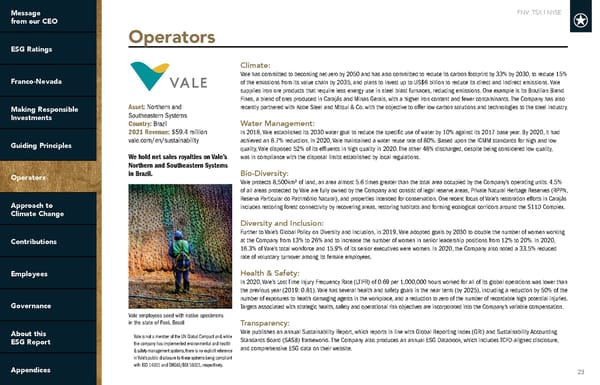FNV: TSX | NYSE 23 Operators Asset: Northern and Southeastern Systems Country: Brazil 2021 Revenue: $59.4 million vale.com/en/sustainability We hold net sales royalties on Vale’s Northern and Southeastern Systems in Brazil. Climate: Vale has committed to becoming net-zero by 2050 and has also committed to reduce its carbon footprint by 33% by 2030, to reduce 15% of the emissions from its value chain by 2035, and plans to invest up to US$6 billion to reduce its direct and indirect emissions. Vale supplies iron ore products that require less energy use in steel blast furnaces, reducing emissions. One example is its Brazilian Blend Fines, a blend of ores produced in Carajás and Minas Gerais, with a higher iron content and fewer contaminants. The Company has also recently partnered with Kobe Steel and Mitsui & Co. with the objective to offer low-carbon solutions and technologies to the steel industry. Water Management: In 2018, Vale established its 2030 water goal to reduce the specific use of water by 10% against its 2017 base year. By 2020, it had achieved an 8.7% reduction. In 2020, Vale maintained a water reuse rate of 80%. Based upon the ICMM standards for high and low quality, Vale disposed 52% of its effluents in high quality in 2020. The other 48% discharged, despite being considered low quality, was in compliance with the disposal limits established by local regulations. Bio-Diversity: Vale protects 8,500km² of land, an area almost 5.6 times greater than the total area occupied by the Company’s operating units. 4.5% of all areas protected by Vale are fully owned by the Company and consist of legal reserve areas, Private Natural Heritage Reserves (RPPN, Reserva Particular do Patrimônio Natural), and properties intended for conservation. One recent focus of Vale’s restoration efforts in Carajás includes restoring forest connectivity by recovering areas, restoring habitats and forming ecological corridors around the S11D Complex. Diversity and Inclusion: Further to Vale’s Global Policy on Diversity and Inclusion, in 2019, Vale adopted goals by 2030 to double the number of women working at the Company from 13% to 26% and to increase the number of women in senior leadership positions from 12% to 20%. In 2020, 16.3% of Vale’s total workforce and 15.9% of its senior executives were women. In 2020, the Company also noted a 33.5% reduced rate of voluntary turnover among its female employees. Health & Safety: In 2020, Vale’s Lost Time Injury Frequency Rate (LTIFR) of 0.69 per 1,000,000 hours worked for all of its global operations was lower than the previous year (2019: 0.81). Vale has several health and safety goals in the near term (by 2025), including a reduction by 50% of the number of exposures to health damaging agents in the workplace, and a reduction to zero of the number of recordable high potential injuries. Targets associated with strategic health, safety and operational risk objectives are incorporated into the Company’s variable compensation. Transparency: Vale publishes an annual Sustainability Report, which reports in line with Global Reporting Index (GRI) and Sustainability Accounting Standards Board (SASB) frameworks. The Company also produces an annual ESG Databook, which includes TCFD-aligned disclosure, and comprehensive ESG data on their website. Vale employees seed with native specimens in the state of Pará, Brazil Vale is not a member of the UN Global Compact and, while the company has implemented environmental and health & safety management systems, there is no explicit reference in Vale’s public disclosure to these systems being compliant with ISO 14001 and OHSAS/BSI 18001, respectively.
 2022 ESG Report | Franco-Nevada Page 22 Page 24
2022 ESG Report | Franco-Nevada Page 22 Page 24